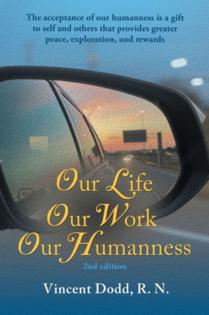A guide to finding harmony and hope in everyday life
Published in Mom's Advice
“Would you like a ticket or would you like to talk?”
Vincent Dodd, from decades as a nurse helping terminally ill patients and their families and then as a law enforcement officer, knows that solutions to crises are often found well below the surface.
So his tendency, and the visual unusuality, to invite conversation rather than issue a speeding ticket while serving as a traffic policeman might be more bother than benefit for the offender. But the sentiment is compelling nonetheless and smacks at Vincent’s motivation to get under the hood of the human mind and soul and help people deal with life’s difficult moments.
What is the origin of the issue, what caused that issue, and how can we not only fix the problem but prevent it from happening again?
Helping people cope. That’s why Vincent wrote his first book several years back, "Our Dying, Our Death, Our Grief," in which he took years of practical knowledge and hours of hands-on experience to offer a book designed to make the process of one of life’s difficult periods as understanding and comforting as possible to patients and families.
Now Vincent continues his personal crusade to be there for people and families in need and help them come to better terms with that which ails them. The result is his recently published second book, "Our Life, Our Work, Our Humanness."
Once again, Vincent employs his arsenal of anecdotes and experience to help people find harmony and happiness in their day-to-day lives, touching upon everything from work, relationships, dealing with change, finding your spirituality and in general easing the pain relating to life’s many trials.
Basically, it’s about getting to the roots of what causes stress and doing everything possible to relieve it. And that’s not always a comfortable process.
“We have become a culture that only wants to accept solutions to our mounting problems if they fit into our pre-existing beliefs and preset agendas,” writes Vincent. “Not every healthy solution will be easy to hear, but many things can get easier if we allow ourselves to accept the more functional big picture answers.”
And those answers are often found searching outside ourselves, dabbling in the unfamiliar, seeking a better and different way, and keeping ourselves open to new ideas and perspectives.
Vincent asks readers to begin with the premise that every person is wonderful and flawed in their own ways, and acceptance of this concept helps them understand that they are all in this thing together that we call “humanhood.” So accept the messiness, stay within it to understand what is outside it. Yes, we are scared of our faults and our weaknesses, but acceptance is the first step to understanding.
Whether in an office environment or simply hovering around the water cooler of life, in "Our Life, Our Work, Our Humanness," Vincent Dodd exposes himself as an open book, sharing his thoughts and ideas so that others may learn and prosper. There is plenty to digest – and unpack – in this very granular look at who we are.
Sometimes the intelligence and tranquility of life can be found right in front of us, even if we are not inclined to look.
Vincent tells the story of when he was a teenager and he suggested to his grandparents that cows have the answers to all the world’s problems – even if they are not able to tell us. He recalls telling them that cows are calm but always pay attention. They will defend themselves but would rather avoid trouble, and “their tail calmly swishes, trying, but knowing, it will only partially help rid the flies.” The only thing they care about is peacefully eating quality grass and their offsprings’ well-being.” Talk about self-awareness.
“Life and work will keep getting easier, personal rewards will grow in many directions and you will continue to make a difference on a wider scale if you commit to remaining a student of self, life, better and our humanness.”










Comments